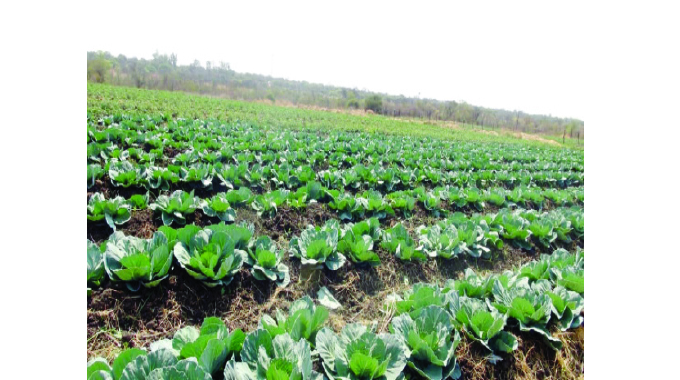Turning an environmental problem into a solution

Gibson Mhaka, Senior Features Reporter
WHEN Mr Ndabezihle Nkomo (76), a small-holder farmer from Village 1 Mazizini area in Nyamandlovu, Umguza District in Matabeleland North province was chosen by fellow villagers to host a biogas digester demonstration at his home, he had no idea that the pilot project would bring joy to his family.
Mr Nkomo’s home is now an envy of visitors to the village as he now uses biogas to cook as well as lighting and refrigeration.
The slurry from the digester provides manure for his vegetable garden.
Before he started using biogas, part of his herd of about 80 cattle only gave him meat and milk that he supplied to the village shops and manure which he was also using to enhance soil fertility and increase crop yields at his small plot.
Today Mr Nkomo produces clean energy and other products from what he was previously considering as waste.
Biogas is a combustible substance consisting mainly of methane that can be produced through fermentation of organic materials such as cow dung or food waste and a biogas digester comprises an inlet chamber, main dome expansion chamber and slurry outlet for liquid waste.
The push towards this type of green energy production is being promoted by Beef Enterprise Strengthening and Transformation (BEST) Project, which demonstrated the biogas digester at Mr Nkomo’s home as part of their efforts to provide green economic growth options for agriculture that can reduce deforestation and reduce greenhouse gas emissions.
BEST Project is one of six projects that are supported by the €40 million funding from the European Union (EU) under the Zimbabwe Agricultural Growth Programme (ZAGP).
ZAGP is a partnership between the Government of Zimbabwe and the EU, supporting various livestock value chains and is making a significant contribution to boosting economic development through agriculture.
The BEST Project is funded to the tune of €7,6 million and is supporting 24 900 small to medium cattle producers in five provinces.
“This biogas system is great. There is no more hardship like before. In just a few minutes, I can enjoy my tea. What I get every day is more than I can use,” said Mr Nkomo, explaining how his life has changed after benefiting from the BEST Project last year.
The BEST Project focuses on solar and biogas as part of composite green economic growth options for agriculture.
The purpose is to provide communities with green economic climate smart agriculture options that are aimed at sustainable environmental management.
The specific aims include reducing deforestation caused by use of firewood, providing gender sensitive energy options that reduce the time spent by women searching for firewood and contributing to the reduction of greenhouse gas emissions, which cause climate change.
Adds Mr Nkomo: “This technology has helped to change my life. I have personally reaped so many benefits and my wife no longer has to worry about fetching firewood. She spends less than an hour in her kitchen cooking food. My kitchen is now clean and smoke-free, which is also good for our health”.
He encouraged other farmers in the area to mobilise resources to build their own digesters.
Another villager Ms Mary Mpofu said shifting to biogas would help improve hygiene and health of the rural population, especially women who are the main energy users.
“Having a digester will help to reduce the health risk, especially in relation to indoor pollution and also reduce the burden faced by many rural women looking for firewood,” she said.
Studies have shown that biogas technology has greatly improved the standard of living of many rural famlies.
In a country where 95 percent of the rural population burns traditional biomass fuels indoors for cooking, heating and lighting, it is the females, who spend most of their time in the smoke-filled kitchens.
The trend of cooking using firewood could have a direct chronic impact on the health of the women and children.
Mazizini Village 1 Head Mr Killiot Ndlovu said many villagers now envy Mr Nkomo’s changed lifestyle and now want to have their own digesters to produce gas for cooking and lighting.
“As villagers we now appreciate the advantages of having a digester and everyone in the village now wants to have one,” said Mr Ndlovu.
He said biogas technology would go a long way in helping preserve the environment and reduce cutting down of trees, which is contributing to climate change.
According to the Environment Management Agency (EMA), about 50 million trees disappear from forests in the country every year as most rural communities depend on firewood for energy.
Biogas expert and consultant Mr Blessing Jonga said biogas is the best alternative energy for rural households since it is sustainable, clean and environmentally friendly.
“The biogas is used for heating, lighting and refrigeration, which provides an alternative energy source for rural households. Biogas technology also helps women and children more since they are the ones faced with the task of looking for firewood,” said Mr Jonga.
He said the slurry from the digester provides manure which families can use in their gardens or fields.
Research has also shown that biogas can actually contribute to the achievement of some of the UN’s Sustainable Development Goals (SDGs). For example, biogas has potential for achieving SDG 7, which aims to ensure that everyone has access to affordable, reliable and modern energy services by the year 2030.
It also has a strong relationship with SDG 2 on Zero Hunger, with a clear link towards addressing food insecurity.
Environmental expert Mr Liberty Dube also concurred with Mr Jonga, saying farmers need to adapt to climate-smart agriculture.
Using slurry from the digesters as fertilizer also reduces farmers’ use of chemical fertilizers and helps maintain soil quality.










Comments